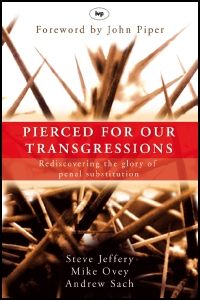You may remember that before Christmas Wayne Grudem, in my blog interview, first added his voice to that of John Piper’s in
accusing Chalke of blasphemy, then modified his statement to really quite a similar position to mine back in 2004 when I said Chalke was “close” to blasphemy.If the website is anything to go on, this new book should be good. The following quote from an article, focused in part on the historic pedigree of penal substitution, published on the site gives a great foretaste:
“Some claim that penal substitution makes God guilty of injustice, inflicting punishment on an innocent man. Such a doctrine, they say, plainly contradicts the Scriptural teaching that guilty people, and only guilty people, should be punished: ‘Acquitting the guilty and condemning the innocent — the LORD detests them both’ (Proverbs 17:15).
Some who believe in penal substitution have replied by pointing out that Christ suffered willingly, or by noting that God gave himself in Christ to suffer in our place. But while these things are gloriously true, neither actually answers the objection. If guilty sinners are acquitted and an innocent third party is punished, then irrespective of his willingness an injustice has been committed, and it is unthinkable that God would do such a thing.
How are we to respond? The flaw in the argument is the unstated premise that Christ is unrelated to the believer, an unconnected third party. This is not true, for believers are in union with Christ — he is in us, and we are in him, indwelt by his Spirit (e.g. John 17:21; Romans 6:5; 8:1; 2 Corinthians 5:17; Colossians 1:27; Philippians 1:1). It is for this reason that the imputation of our guilt to Christ and his righteousness to us, his punishment and our acquittal, are just in the sight of God. The apostle Paul captures both sides of the exchange in a single verse: ‘God made him who had no sin to be sin for us so that in him we might become the righteousness of God’ (2 Corinthians 5:21). “

















